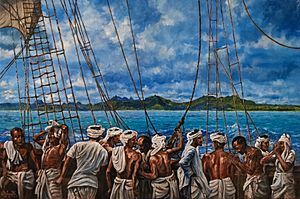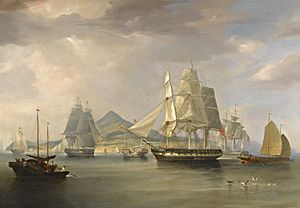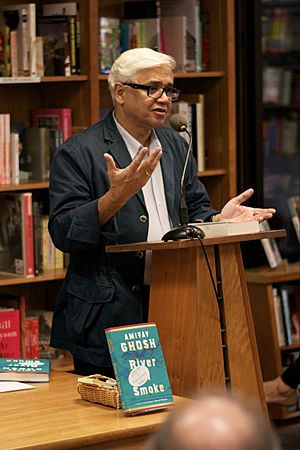Ibis trilogy facts for kids
|
|
| Author | Amitav Ghosh |
|---|---|
| Country | India |
| Language | English |
| Genre | Historical fiction |
| Publisher | Penguin Books |
| Media type | Print (hardback & paperback) Audiobook E-book |
| No. of books | 3 |
The Ibis trilogy is an exciting series of three books by Indian author Amitav Ghosh. These books, Sea of Poppies (2008), River of Smoke (2011), and Flood of Fire (2015), tell a big story set in the 1830s. The tales unfold across the Indian Ocean region, leading up to a major historical event called the First Opium War.
The series mainly focuses on the trade of a special crop called opium between India and China. It also explores the journey of workers, known as girmityas, who traveled to Mauritius. The Ibis trilogy is well-loved for its amazing historical details and important themes. A TV show based on the books was announced in 2019.
Contents
What Are the Books About?

The trilogy is named after a ship called the Ibis. This ship was once used to transport people for forced labor, but it was later changed to carry opium and workers. Many of the main characters in the story meet for the first time on this very ship. The series takes place in the 1830s around the Indian Ocean, leading up to the First Opium War. The story doesn't always go in a straight line; it jumps around in time.
In Sea of Poppies, the Ibis leaves Calcutta with workers and prisoners heading for Mauritius. But the ship gets caught in a huge storm and faces a mutiny (when the crew rebels).
River of Smoke takes us to China, especially around the Thirteen Factories area. This is where the opium was sent. Tensions start to grow between local Chinese officials and international traders. This second book follows people from two other ships caught in the same storm as the Ibis. One is the Anahita, carrying opium to Canton, and the other is the Redruth, on a plant-finding trip, also to Canton.
Flood of Fire shows us the start of the First Opium War and how it affected the Indian Ocean region. This war even led to the creation of Hong Kong.
The novels feature many different characters from various backgrounds. You'll meet farmers from Bihar, wealthy landowners from Bengal, and traders and officials. These characters come from British, Chinese, and Parsi families. Besides their own languages, the books also introduce readers to different "pidgin" languages. These are mixed languages used by people from different countries to communicate, especially sailors.
The Real History Behind the Story
The Ibis trilogy is set during the 1830s, a time when the trade of opium was a big issue in China. This trade was very profitable for British and American merchants. Chinese officials tried to stop it through talks, but when that failed, Commissioner Lin Zexu ordered all opium in the port of Canton to be destroyed in 1839.
The British Navy responded, which started the First Opium War. Britain defeated China and made several agreements that were not fair to China. These agreements allowed Britain to take control of Hong Kong. These events had a huge impact around the world and helped the British Empire grow even larger.
Author Amitav Ghosh especially focuses on India's role in this trade and conflict. He was inspired by the lives of Indian workers who moved from the Bihar region. He found many connections between their lives and the opium trade. Ghosh spent 10 years writing the series. He did so much research that he could have written several history books about the Indian Ocean!
Main Ideas and Writing Style
Colonialism and Global Connections
The Ibis series is seen as a work of "postcolonial literature." This means it looks at the history and lasting effects of the colonial era. Ghosh uses the opium trade to show how people lived under the British Empire. He also makes us think about the right and wrong of the opium trade, including the use of forced labour. He suggests that opium was very important for the British Empire's economy.
Ghosh also uses the opium trade to talk about early forms of globalization (how the world became more connected) and commercialization (making things into products to sell). The series explores different relationships that came from the opium wars, like wealth and poverty, closeness and being left out. The story covers the whole Indian Ocean region, showing it as a key place for discussing colonial history. Ghosh also highlights the stories of ordinary people, often overlooked in history books.
Water's Importance
Ghosh has said that water is a very important theme in the series. He explained in 2015 that he grew up in West Bengal, where water and rivers are a huge part of life. For him, water is a big part of his imagination.
The Power of Language
Ghosh uses and changes different languages in the series. This helps him explore ideas about people moving to new places (diaspora), globalization, and mixed languages. He adds at least 23 languages other than English into his writing. He calls this mix "zubben." The book Sea of Poppies even includes a "Chrestomathy," which explains the meanings and origins of many words used in the story.
What's Next for the Ibis Trilogy?
Even though the trilogy is finished, Ghosh hinted in 2015 that he might return to these characters someday. In March 2019, it was announced that a TV series based on the books would be made. Shekhar Kapur was named as the director, and Michael Hirst as the writer. In 2023, Ghosh released Smoke and Ashes, a non-fiction book about the history of the opium trade. This book was based on all the research he did while writing the Ibis trilogy.
See also
- Canton System
- Tai-Pan
- The Opium Clerk
 | Audre Lorde |
 | John Berry Meachum |
 | Ferdinand Lee Barnett |



